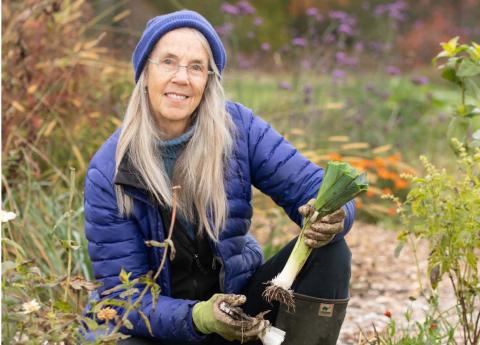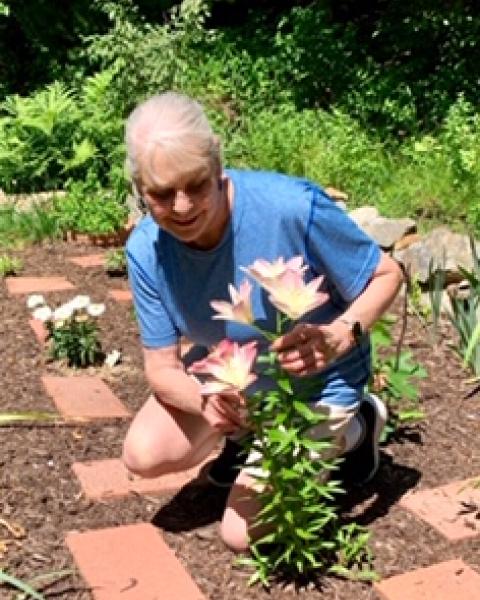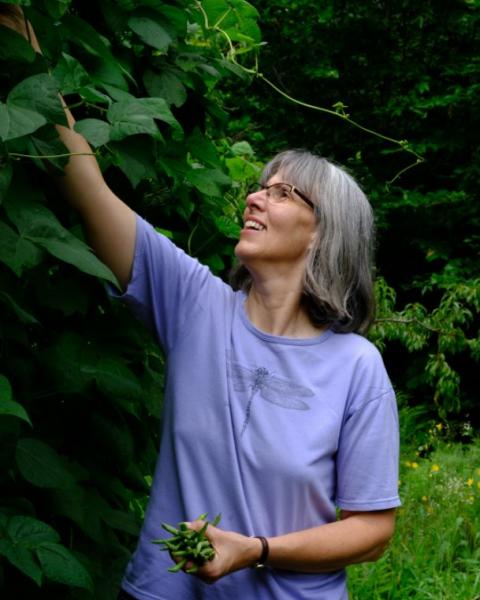A Dream Come True For Suzanne MacDonald

The idea of having a community garden was on Suzanne MacDonald’s mind for years. Her dream was realized 11 years ago when Wagon Hill Community Garden in Durham was formed. Yet, the dream did not materialize instantly and there was back-stepping along the way.
In years past, Suzanne gardened in India, Scotland and parts of the United States through her job with the non-profit Merriam Hill Center, in Cambridge, Mass. The Center which is no longer in operation, had an organic kitchen garden in Greenville, N.H., where Suzanne worked.
The Town of Durham bought Wagon Hill Farm in 1990 with no exact plans for its future. Suzanne and others thought Community Sponsored Agriculture (CSA), gardens where consumers buy shares from farmers, would be a good idea for part of the property. Trauger Groh, one of the pioneers of CSA principles and co-founder of New Hampshire’s Temple-Wilton Community Farm, was asked to speak to the town decision makers. A Wagon Hill CSA sparked interest and the Town of Durham approved a two-acre piece of the 140-acre farm to be used for that purpose. The plot was horse-plowed and a cover crop was seeded that fall. Suzanne said, “We got excited,” but the town decided it wasn’t quite ready to commit.
Suzanne, who has lived in Durham 30 years, knew she wanted “to have a garden where people could meet on friendly terms, learn from each other and enjoy being outdoors.” In 2008 she again raised the idea of a community garden. Her husband, Dennis Meadows, worked with Durham’s administrators to “find a piece of land that people in Durham could walk to”. They found a “terrific piece” of property, but about two dozen people protested having a garden behind their homes. It was “time to go back to the drawing board,” says Suzanne. Once again, Wagon Hill Farm was proposed, and Durham approved the plan and “we were off and running, building the first nine plots, with six gardeners.”
In 2009, Dennis wrote a grant proposal to Timberland, an outdoor clothing retailer in nearby Stratham. They provided materials and 75 volunteer employees to build 24 beds on Earth Day in 2009. A second Timberland grant was awarded in 2010. From there things really began to grow. Wagon Hill Community Garden (WHCG) now has 120 growing spaces and 70 gardeners.
The garden’s steering committee meets monthly, year-round, to coordinate the WHCG. There is a March sign-up meeting in Durham, and they fill their quota each year. Members get “well water, used tools/carts, picnic tables for relaxation, a bit of shade, and compost each spring.” Gardeners are required to work two days, totaling six hours per season (April to October) to contribute to the community space. Three Master Gardeners, including Suzanne who became a MG in 2016, meet a few times each year to help gardeners with questions. Wagon Hill Community Garden has a plot dedicated to two Durham food pantries and a volunteer team makes weekly deliveries.
Suzanne credits Durham for its enormous support. She says it takes an “idea person to get something started, but it takes an amazing group of volunteers to make this garden what it is.” WHCG, she says, “is what I dreamed for a community garden.”
Photo credit: Elise Sullivan
UNH Cooperative Extension Master Gardener volunteers share information about home, yard, and garden topics with the people of New Hampshire. Got questions? Master Gardeners provide practical help finding answers to your questions through the Ask UNH Extension Infoline. Call toll free at 1-877-398-4769, Monday to Friday, 9 a.m. to 2 p.m., or e-mail us at answers@unh.edu.

